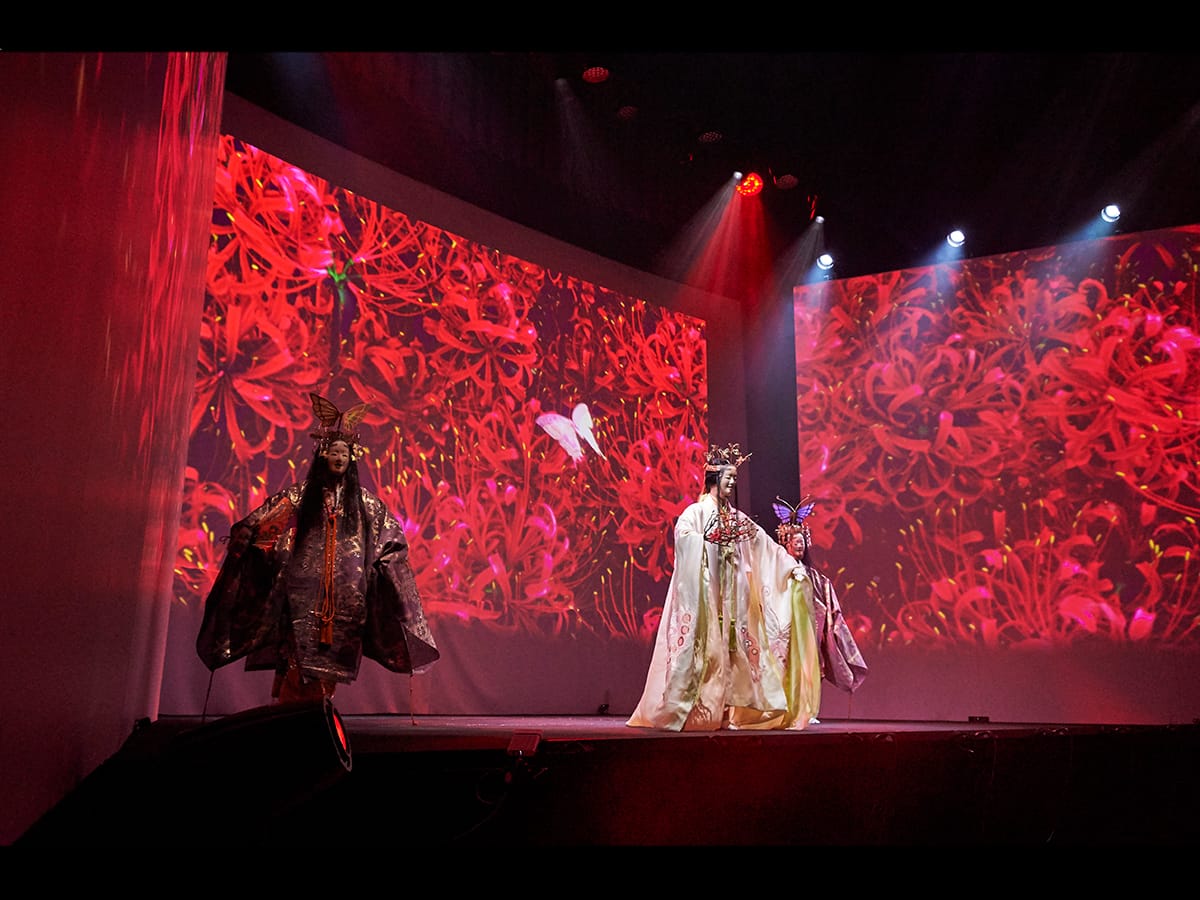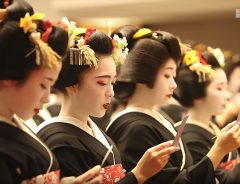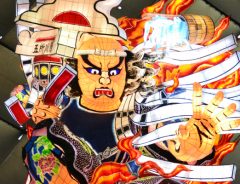
Source: ©2021 TOEI KINOSHITA GROUP
You’ve never seen Noh like this before! Toei’s Noh spectacle is a fantastic, immersive experience
- Tags:
- 3D / immersive / Japanese theater / Noh / Performance / Toei
Related Article
-

“Macho Ice” Serves Up Refreshing Iced Treats from Macho Hunks This Summer
-

The Geishas of Kyoto’s Gion District Gather For A Flamboyant New Year Ceremony [Video]
-

Japanese Artist’s Tricky 3D Anime Character Illustrations Are Too Good To Believe
-

Drones, Shamisen, and 16,500 LED Lights: A Spectacle Of Japan’s Modern Technology
-

All of Japan’s Traditional Festivals and Regional Delicacies Under One Roof: Furusato Matsuri at Tokyo Dome
-

“Pong!Pong!” Adds a Fun, New Dimension to Table Tennis Through Mixed Reality Technology


Noh theater
The classical Japanese dance-drama Noh 能 is one of Japan's most famous and internationally recognized art forms. Performed since the 14th century, it is the world's longest-lived extant theater art. Highly symbolic in nature, with a sparse stage devoid of decorative elements, and actors wearing masks narrating stories often dealing with ghosts, deities, and demons, Noh is powerful and unique. Outside of Japan, theater practitioners from Bertolt Brecht, Samuel Beckett, and Paul Claudel as well as poets like William Butler Yeats have been inspired by the venerable Japanese theater art.
For audiences unaccustomed to it, however, Noh's slow pace, minimalistic set, and the use of masks and stylized gestures to convey emotions can make it difficult to follow.
Fortunately, there's an exciting performance coming up which can provide a window into this art form through an unprecedented spectacle which you can enjoy even if you've never seen a Noh play before.
"Infinity of Japanese Beauty 神GOD・鬼EVIL・麗BEAUTY,
THREE SPECTACLE NOH LIVE STAGE ∞2020"
©2021 TOEI KINOSHITA GROUP
This performance is a completely new form of entertainment that combines the traditional Japanese performing art of Noh with the fantastic and realistic world of Immersive Theater, a powerful three-screen installation that makes full use of cutting-edge computer graphics!
As the name suggests, the performance combines climactic moments from three of the most popular Noh plays, Takasago, Momijigari "Maple Viewing", and Kochō "Butterfly." Each play is represented by the kanji 神, 鬼, and 麗, which stand for God, Evil, and Beauty, respectively.
With three screens newly set up just for this performance and powerful sound effects to stimulate your ears, it's a truly immersive experience that conveys the fantastic and supernatural worlds from Noh narratives in a way that has never been achieved before.
We had the privilege of attending an advanced performance conducted for the press, and we were impressed by the way all the elements, from the dancing of the performers in their gorgeous costumes (particularly those designed by Hanae Mori in Kochō "Butterfly"), the visual effects, the soundscape, and the beautiful computer graphics combined to create a truly immersive experience.
Even if you've never experienced Noh before, this one-of-a-kind spectacle will let you "enjoy the beauty of Japan on a grand scale."
Online streaming
Due to the spread of the novel coronavirus infection and the Japanese government's announcements, "Infinity of Japanese Beauty 神GOD・鬼EVIL・麗BEAUTY, THREE SPECTACLE NOH LIVE STAGE ∞2020," which was originally scheduled to be performed at the Marunouchi TOEI theater, will now be streamed online. (See details below).
Even though it will be streamed, however, you'll still be able to enjoy climactic moments from the popular Noh plays Takasago, Momijigari "Maple Viewing", and Kochō "Butterfly" with the same live atmosphere as the actual performance.
In addition, you can look forward to VR screenings scheduled for this fall!
This fusion of Japanese performing arts and cutting-edge technology will be available for you to enjoy in the comfort of your home. Please don't miss it!
Takasago 高砂 [神GOD]
©2021 TOEI KINOSHITA GROUP
©2021 TOEI KINOSHITA GROUP
Early spring, on the beach at Takasago in Banshu. On his way to Kyoto, Tomonari, Guardian of the Shrine of Aso in Higo, sees an elderly couple sweeping needles from around the base of a pine tree, and asks which is the pine-tree of Takasago, which together with the pine tree of Sumiyoshi is part of a phrase meaning “to grow old together,” even though Sumiyoshi is far from this place. The couple gets into a boat and sails away.
Tomonari also sails to Sumiyoshi, and the holy dance of prayer for the Emperor and for the land takes place. It is the beginning of spring, and the mood is calm in its unchanging green. The elderly couple, symbolizing the long ages of the pine tree, also stands for a long and happy married life.
Momijigari "Maple Viewing" 紅葉狩 [鬼EVIL]
©2021 TOEI KINOSHITA GROUP
©2021 TOEI KINOSHITA GROUP
©2021 TOEI KINOSHITA GROUP
A lady of seemingly noble rank and her attendants are out in the mountains for a party to view the autumn leaves. The warrior Taira no Koremochi, out with his attendants hunting deer, finds it strange that they should be viewing the leaves in such a place but, unwilling to disturb their revelry, dismounts from his horse, changes his path, and is trying to pass quietly by when the noblewoman stops him and invites him to join their party. With a beautiful woman pouring for him, he drinks more than he can remember, and falls asleep, at which point the watching women vanish.
As Koremochi dreams, a god appears with a message. In surprise, Koremochi awakens to find that the women have revealed themselves as the demons they really were. Koremochi, however, does not flinch. Calling on the Hachiman Daibosatsu, Taira no Koremochi stands against the demons and vanquishes them. While there are other plays involving demons in the mountains, this contrasts the hero vanquishing the demon with an autumn flower-viewing party, and speaks to both the attraction of a beautiful woman and to the truth of the proverb: “Saint without, devil within.”
Kochō 胡蝶 "Butterfly" [麗BEAUTY]
©2021 TOEI KINOSHITA GROUP
©2021 TOEI KINOSHITA GROUP
©2021 TOEI KINOSHITA GROUP
A visiting monk from Yoshino stands gazing at the flowers of a plum tree at the foot of the steps of an imperial palace in the Ichijo Omiya area of Kyoto. A woman appears from under the eaves, where no one had seemed to be. She tells him that here the nobles of ancient times held poetry and music gatherings. The monk, suspicious, asks the woman’s name, and she says she is a butterfly with a deep connection to flowers who grieves because she knows nothing of the plum blossoms. She has appeared in this form because she wishes to have the Lotus Sutra read and thus ascend to Lord Buddha and join herself with the plum blossoms. She promises to appear in the monk’s dreams, and vanishes.
The monk begins to chant the sutra, and the spirit of a beautiful butterfly appears. Delighted that through the power of the Lotus Sutra she has joined with the plum blossoms, she dances among them and disappears into the sunset clouds. Besides the novelty and the butterfly’s loveliness as inspired by this story of her yearning for the plum blossoms, the piece can also be thought to aim for the elegance of the flowers themselves. It is as well an exercise in spiritual improvement, with the butterfly attaining her innocent wish through Lord Buddha.
Comments from the performers for the international audience
We were able to catch up with Stage Director, Performer and Chorus (jiutai) Takanobu Sakaguchi, as well as Performer Saburōta Kanze, Son of Kiyokazu Kanze, 26th Grand Master of the Kanze School, after the press-oriented performance.
They kindly provided us with the following comments for the international audience:
Saburōta Kanze
"This 3D Noh collaboration with Toei is something very rare that you don't usually get to see.
I think it will make it easier for people to learn about Noh.
People tend to think of Noh as something that is difficult to understand, but I believe that anyone can enjoy it, so I would like to invite you to see it."
Takanobu Sakaguchi
"I think the main theme of this show is the fusion of the oldest Japanese theater art and the latest technology.
I think that this fusion with modern technology proves that Noh theater is not a frozen artifact, but a form of theater that is still alive today.
I think this is a work that will stir the hearts of not only Japanese people, but also those who don't understand Japanese, so I really hope you will see it."
Streaming information
A video of the performance will be available for pre-sale on Mirail from Friday, August 27 (purchase page).
For the latest information, visit the official website.
Cast
Recording Cast